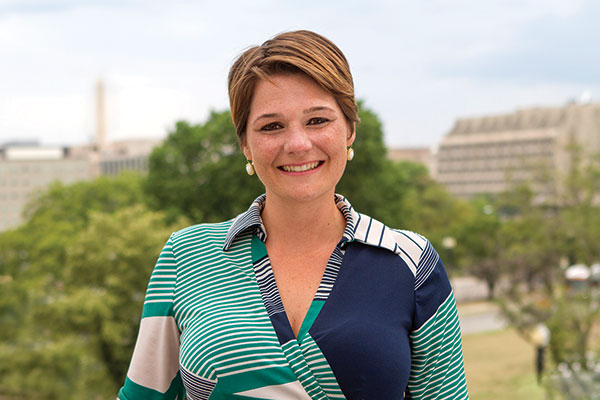What Do You Get for the Person Who Saved Your Life?
by Kate Yglesias Houghton
My cancer journey begins like that of many young adults: I didn’t feel well. My plan was to go to the doctor and get something that would ameliorate the tired, groggy, out-of-shape, all-around grossness that seemed to be plaguing me.
The problem was: I didn’t exactly have a doctor to call. After 30 intense minutes of research, trying to find my insurance card, and then making a list of doctors to call – there was literally only one doctor in all of Washington, DC, who could see me that day. I immediately booked it downtown.
After handing over my practically new health insurance card, I planted myself in a waiting room chair and checked emails before being called back. The physician’s assistant took one look at me and said: “I saw you in the waiting room and thought, ‘That girl is sick.’”
Relief washed over me. No sell job, no fifty questions. The feeling of exhaustion and weakness that plagued me at every turn, it was real and she saw it. But no one expected to see what was in my bone marrow.
Within two weeks, I was admitted to Johns Hopkins Hospital in Baltimore, MD, to begin treatment for acute myeloid leukemia. I was 27 years old.
Flowers? Cookies? Chocolates? A bazillion dollars? Well, that might be tough, but she deserves every penny.
The average delay from onset of symptoms to a cancer diagnosis for an adolescent or young adult between 15 and 39 years of age is 75 days. I asked my oncologist how long I could live with my cancer without treatment; he said three to six weeks. That’s 42 days tops. I shouldn’t be here …
But I am, and it’s because one person saw me for what I was: very sick. She didn’t dismiss me as a healthy young adult. She didn’t make assumptions about what it could or couldn’t be. She wasn’t hearing hoof beats and expecting to find a horse. No, she anticipated the possibility of finding a zebra. She ran a blood test. She saved my life.
A few years ago, my oncologist gave me the all-clear to start seeing my “normal, everyday” doctors again. Unfortunately, that physician’s assistant was no longer at the practice, but all my records were there so it made a lot of sense to stay put.
Fast forward to 2017, and like every “normal” person, I was due for a check-up. Scheduling a time that worked for both my GP and my schedule was quite a challenge.
“When can you come in?”
“I’m free tomorrow morning.”
“The doctor isn’t available, but you can see the physician’s assistant, [INSERT NAME OF THE MOST AMAZING WOMAN IN THE WORLD HERE].”
“Oh my god.”
“Are you OK?”
“Yes, yes, yes.”
“So, you want the appointment?”
“Yes, yes, yes.”
“OK. We will see you tomorrow morning.”
Once I got off the phone and started breathing again, my mind swarmed with questions: What do you say to the woman who didn’t dismiss you as young and invincible? How do you show your gratitude to someone who didn’t buy into your “all good, just need some antibiotics” self-diagnosis?
Flowers? Cookies? Chocolates? A bazillion dollars? Well, that might be tough, but she deserves every penny.
Each year, 70,000 adolescents and young adults are diagnosed with cancer in the U.S. We aren’t supposed to have cancer (at least not statistically), even if it is the number one cause of disease-related death for our age group. Adolescents and young adults represent eight percent of all cancer diagnoses each year, which, according to the National Cancer Institute, is six times higher than cancers diagnosed at age 14 or younger.
In an interview with The Washington Post, speaking about her role as Leslie Knope on NBC’s Parks and Recreation, Amy Poehler says, “Some people get in the way of change happening. Some people spend their whole careers thinking they can make a difference. Other people want to do as little as possible to get the day done.”
To the woman who saved my life, I say: You changed my life, you made a real difference, and you did everything possible to ensure that day wasn’t my last. Thank you.
Kate Houghton is president and CEO of Critical Mass: The Young Adult Cancer Alliance. Prior to joining Critical Mass, Kate served a senior staff member to a Chief Deputy Whip in the U.S. House of Representatives and leader of the national Democratic Party. In 2011, she served on President Barack Obama’s re-election campaign, promoting the benefits of the Affordable Care Act. While on the campaign trail, Kate was diagnosed with acute myeloid leukemia at just 27 years old. She successfully completed treatment over four months before rejoining the campaign. Kate teamed up with Critical Mass in 2013 and is now focused on ensuring the unique needs of Americans diagnosed with cancer between 15 and 39 years of age are fully recognized by decision makers from hospital administrators to policymakers in Washington, DC.
This article was published in Coping® with Cancer magazine, November/December 2017.
Everyone has a unique story to share. Do you want to share your survivor story? We consider a cancer survivor to be anyone living with a history of cancer – from diagnosis through the remainder of life. Here are our submission guidelines.


